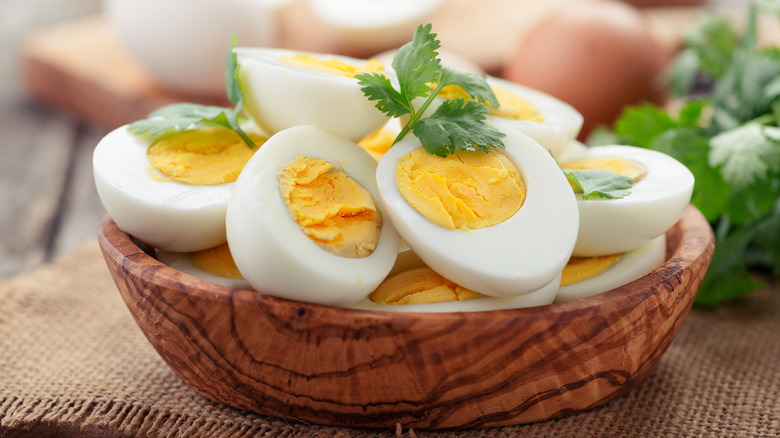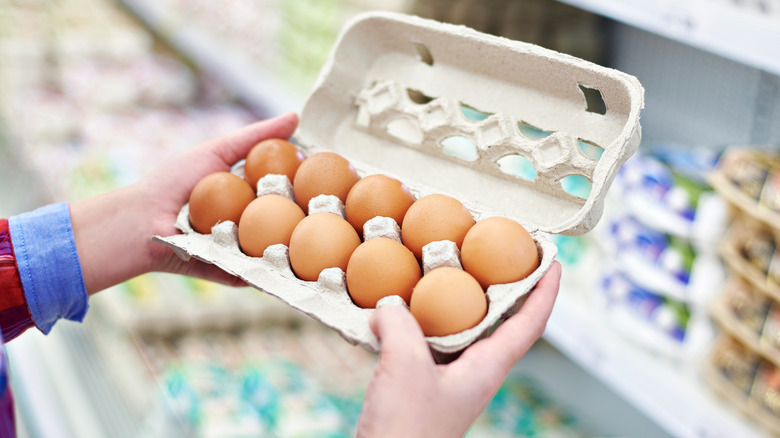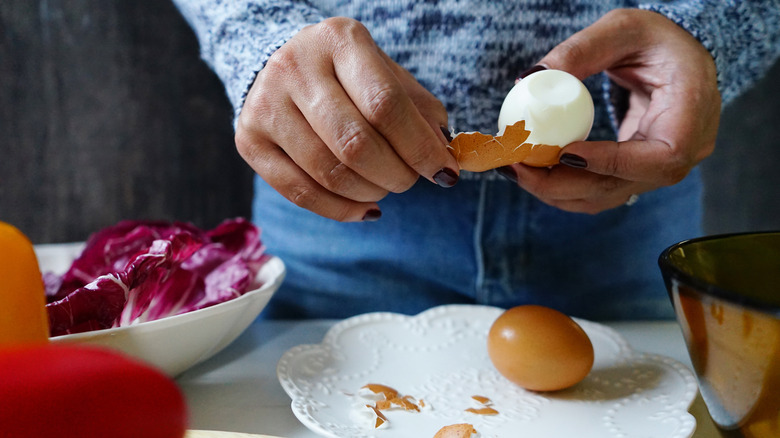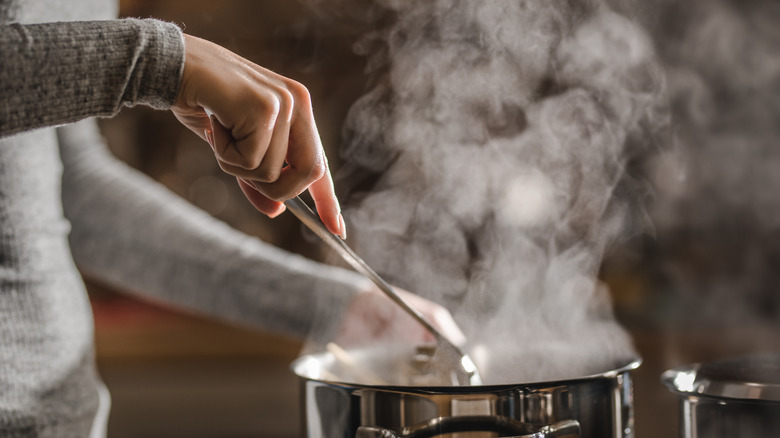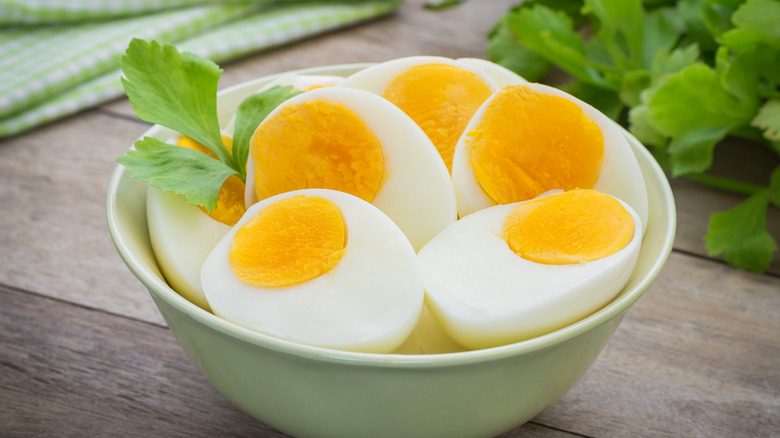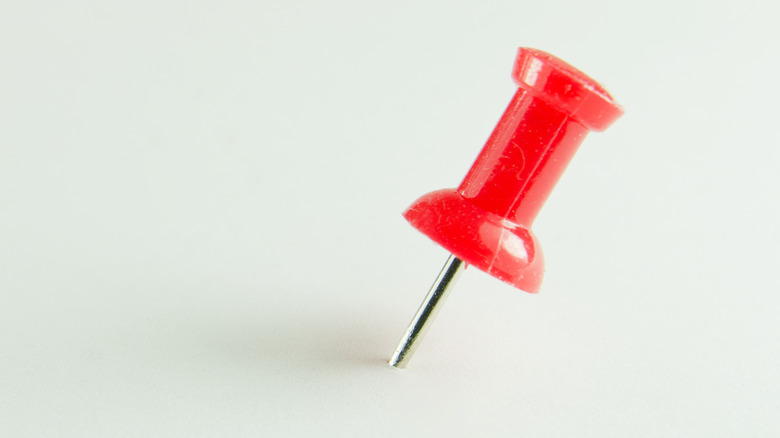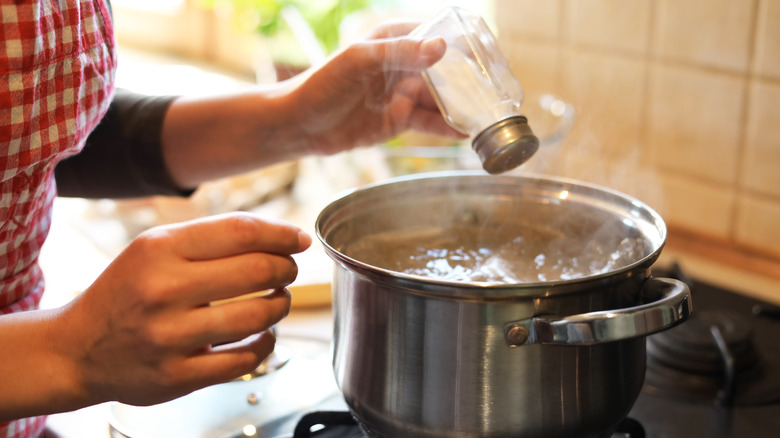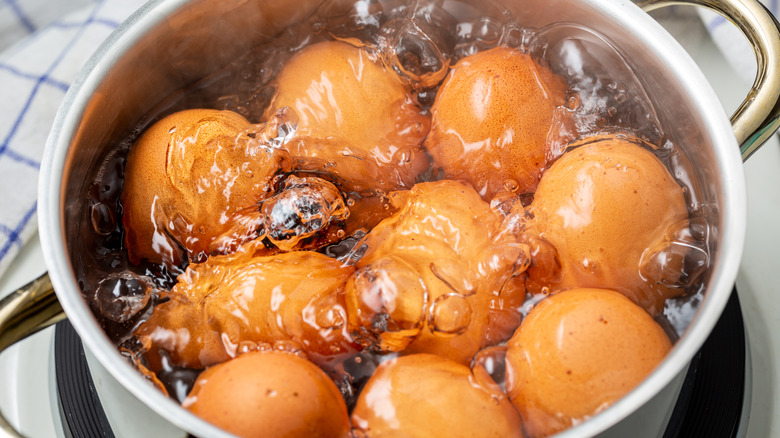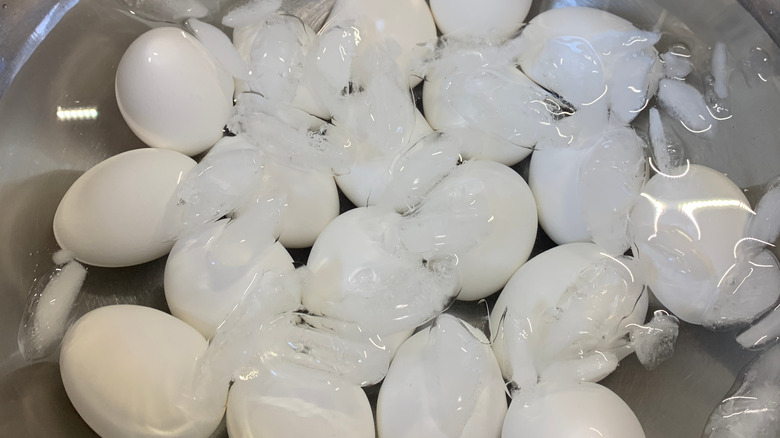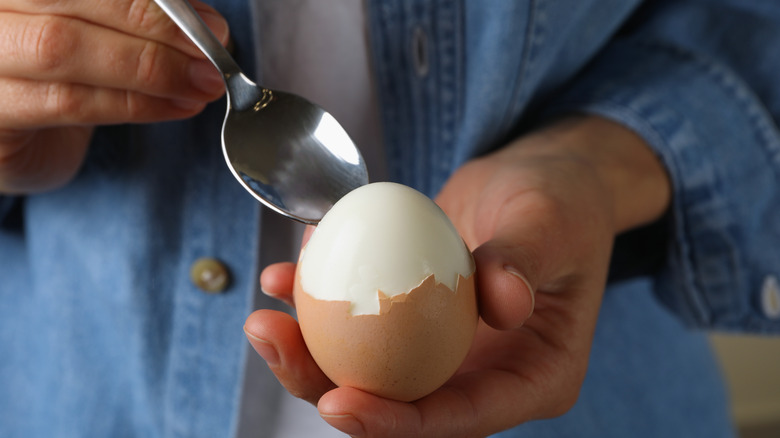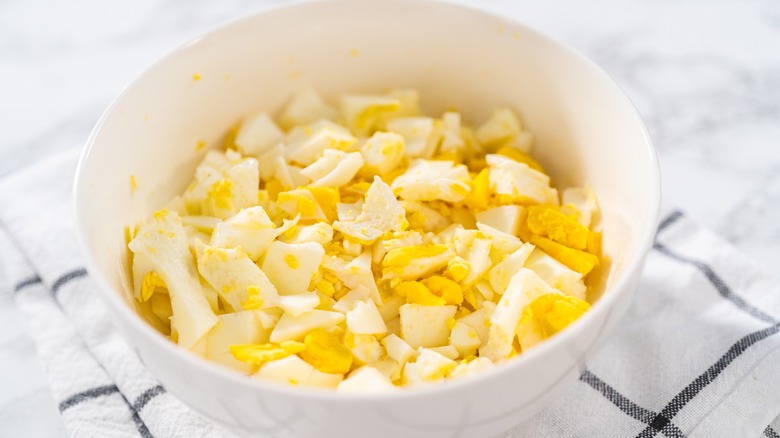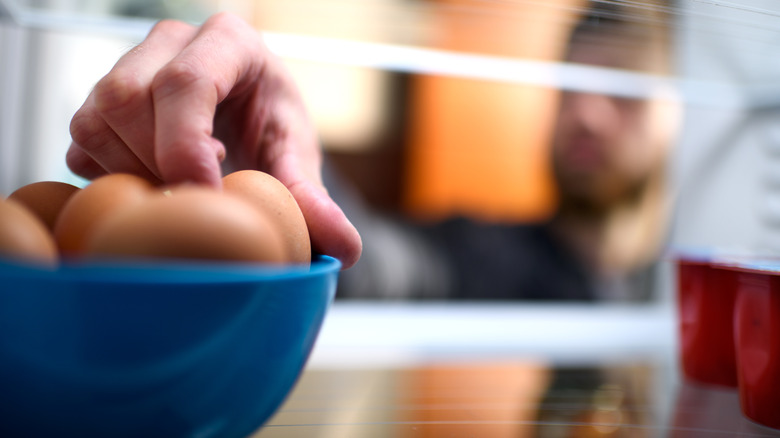Avoid These 12 Mistakes With Hard-Boiled Eggs
At first glance, making hard-boiled eggs might seem easy. After all, the recipe only involves a few key ingredients, like water and, well, eggs. Plus, the whole process ostensibly involves throwing eggs into hot water, bringing them to a boil, and enjoying a perfectly cooked specimen.
In practice, however, the reality of making hard-boiled eggs is a little bit more complicated than that. Indeed, many home chefs struggle to whip up this delicious treat. Many find themselves producing a final product that is too jiggly inside, or even one that contains that dreaded green yolk. Plus, don't even get us started about the plight of an eggshell that just won't peel off. How many times have you tried to remove the shell, only to find the whole egg crumbling in your hands? Probably at least a few times too many.
The good news is that if you are hoping to make egg salad or even classic deviled eggs, all is not lost. There are a few tried and true tactics that you can employ to ensure that your eggs will come out as perfect as possible. From buying fresh produce to trying to peel your final product whole, these are some of the mistakes to avoid when making hard-boiled eggs.
1. Not buying eggs from the farmers market
Generally speaking, buying fresh produce is considered a good thing, and eggs are no exception. In fact, getting your eggs straight from a local farm is an awesome way to elevate your scramble or even take your omelet game up a notch. That being said, when it comes to making hard-boiled eggs, things are a little bit different. The truth is that purchasing recently-collected eggs from your local farmers' market might be holding back your hard-boiled fare.
The reason for this, according to the United States Department of Agriculture, is that fresher eggs are actually harder to peel after boiling. While that might seem odd, there is a scientific reason why this happens. As explained by Wired, eggs contain carbon dioxide within their liquid interior. As time goes on, this gas is released from inside the raw egg and forced to gather towards the bottom of the shell. This chemical process results in the air pockets that we often find between the fleshier part of the egg and its exterior. The more time that passes, the larger this pocket will be — and the easier it will ultimately be to peel your hard-boiled snack.
Of course, that does not mean that you should cook with old or rotten ingredients. Instead, just reach for your typical supermarket eggs. They won't be as fresh as those from the farmers market, but they will still be safe to eat.
2. Forgetting to peer inside the carton before checking out
Even though fresh eggs can be hard to peel, we don't recommend buying a product that looks even remotely suspicious. To ensure that you are actually buying good quality food, the best thing you can do is peer into your egg carton before taking it home. According to the U.S. Food and Drug Administration, eggs that appear unwashed could actually be dangerous to consume. The governmental organ also warns against buying cracked eggs, as these have a higher chance of containing harmful bacteria, such as salmonella.
With this warning in mind, be extra careful to inspect your carton next time that you are planning to make hard-boiled eggs. Take a good look at each of the specimens and ensure that none of them is chipped or covered in dirt. Also, remember that even eggs that are within their expiration dates could pose a health risk if not properly stored.
While it might seem silly to take this extra precaution, it could actually save a life. As revealed by the FDA, people with weakened immune systems — including pregnant women — can risk death when exposed to salmonella. Even if you don't fall into that category, it's still a good idea to be safe.
3. Leaving your baking soda on the shelf
When you are getting ready to cook up a batch of hard-boiled eggs, chances are that baking soda is not on your ingredients list. After all, most people boil their eggs using a simple combination of salt and water. Plus, a lot of people tend to associate baking soda with cookies or cakes. That being said, it turns out that boiling eggs without baking soda could actually be a huge mistake — and there is a scientific reason for this.
As revealed in a piece for Delish, baking soda is made of alkaline. This means that if you add a spoonful of baking soda to a pot of boiling water, it will increase the alkaline content of your brew. Interestingly, when you add your eggs into the mix, this substance can actually help prevent the egg whites from sticking to the shell. As a result, when you go to peel your eggs later on, you will likely find that the process is way easier than you expected.
To put this handy trick to use, start off by setting your water to boil. Then, as soon as the water starts bubbling, go ahead and add a teaspoon of baking soda to this mix. Continue cooking your eggs for as long as necessary, then pull them off the stove and let them cool down. When it comes time to peel your hard-boiled eggs, prepare to be surprised.
4. Adding hot water to the pot
If you want to speed up your hard-boiled eggs, you might be tempted to add hot water to your cooking pot. From a certain perspective, this idea makes sense. The logic goes that hot water will take less time to boil — which means that your hard-boiled eggs will cook faster. And who wouldn't want to save a minute or two?
Unfortunately, however, using hot water in your pot might actually be a massive cooking mistake. According to a report in the Los Angeles Times, one of the biggest problems with a homemade hard boil is overcooking. Indeed, many home cooks have sliced their finished eggs in half, only to notice a grayish or greenish hue encircling their yolks. Beyond the possibility of being a bit off-putting, this change in coloring is a surefire way to know that your eggs are overdone. Other signs include a chalky interior and the not-so-faint stink of sulfur — which are not exactly appetizing.
To avoid this outcome, try not to expose your hard-boiled eggs to unnecessary levels of heat for too long. This means starting out by adding cold water into your pot, rather than any hot or even lukewarm alternatives. This strategy will allow your egg to heat up slowly — rather than all at once — which will help you keep the threat of overcooking at bay.
5. Boiling your eggs for more than 1 minute
Because overcooked eggs are such a bummer, you might want to take extra precautions to ensure that your hard-boil fare does not spend too much time in the heat. Of course, you can take our advice and try to fill your pot with cold water. But that's not the only strategy that you can try. Home cooks who are interested in making sure their eggs reach the perfect internal consistency might want to boil their ingredients for approximately 60 seconds. As elaborated in the Los Angeles Times, this will allow your eggs to get hot without getting too hot.
Indeed, as outlined by the outlet, one of the best strategies for boiling eggs is to place your eggs in a pot and slowly heat the water. Once the water begins to bubble, allow your eggs to boil for 1 minute, then quickly switch off the heat. However, instead of pulling your eggs from the stove right away, go ahead and let them soak in the hot water for another 20 minutes or so. This will allow your eggs to cook at a high temperature, without forcing them to stay at the all-too-high boiling point of 212 degrees. The result will be eggs that are not only safe to consume but also boast that gorgeous yellow interior that so many of us love.
6. Cooking without your trusty thumbtack
What does a thumbtack have to do with making hard-boiled eggs? At first glance, this question might seem like the start of a bad joke. However, in practice, a thumbtack could be the very tool that you need to peel a stubborn egg out of its shell — or even cook your eggs faster.
Indeed, George Weld, who opened the Williamsburg restaurant Egg (which is now closed), says that he often pricks his eggs with a thumbtack before cooking them. Apparently, this makes his hard-boiled eats easier to open. Speaking to Self, the restaurateur shared that the best place to poke a hole is in the bottom of the egg. Despite feeling unsure about the science, Weld insisted that the method really works.
Interestingly, though, Weld is not the only one who swears by the thumb-tack strategy. Celebrity chef, Jacques Pépin, has also gone on record saying that he pricks holes in his eggs, as well. However, unlike Weld, the Frenchman does not do this to help peel his eggs. As he wrote in his cookbook, "Essential Pépin" (via The Kitchn), poking a hole in your egg will actually help it cook more thoroughly. Indeed, this will help release the air accumulated at the bottom of the shell. It will also allow hot water to come into direct content with the egg itself. Ultimately, this tactic should also speed up the cooking process.
7. Forgetting to keep your salt handy
If you are looking to bring your hard-boiled egg game up a notch, there is one secret ingredient that you should add to your grocery list: salt. This ingredient will not only add a boost of flavor to your meal, but it will also help you in case of any "egg-mergencies" – see what we did there?
Bad jokes aside, one of the biggest challenges when making hard-boiled fare is watching one of your eggs split open while the water is still boiling. As explained by Slurrp, this unfortunate phenomenon can happen for a few different reasons, including gas escaping from the eggs, which prompts them to expand, ultimately breaking your shell. You can usually tell that this is happening because you will see your egg's inner liquids begin to leak out into the water.
Interestingly, however, there is a strategy that you can use to prevent leaky whites from getting between you and your egg salad. According to Exploratorium, adding salt to your boiling water can stop a spill in its tracks. The scientific reason for this is that egg whites cook more quickly in salt water than they do in freshwater. This means that the leaky part of your egg will solidify relatively quickly after coming into contact with the salty water in your pot. In the end, this will turn your leakage into a makeshift "plug," preventing more fluid from seeping through the cracks.
8. Cramming a bunch of eggs into your pot at once
For the sake of saving time — or even just feeding a bunch of people — you might be tempted to boil a whole bunch of eggs all at once. You might even decide to "layer" your eggs by placing them on top of each other. While this strategy might seem like a good way to prepare as many hard-boiled eats as possible, it does have a couple of major flaws.
For one thing, it is possible that different regions of your pot will have different temperatures. This means that your lower layer of eggs might cook a bit more quickly than your upper layer. Because of this, you will probably end up with pretty mixed results. While some of your hard-boiled eggs might come out overcooked — with that odorous sulfur scent — others may appear to come out with gooey whites — a sure sign that they aren't yet done.
On top of that issue, layering your hard-boiled eggs can lead to chipped or cracked shells. This is because cramming a bunch of eggs together in a tight space will almost inevitably result in a bit of bumping. Unfortunately, though, the more that your eggs crash into each other, the more likely one is to break, and the more likely you are to end up one egg down.
9. Ditching the ice bath method
Preparing an ice bath for your hard-boiled eggs might sound more like a stunt that a celebrity chef would pull rather than something you could actually do in your own kitchen. But, as extreme as this idea might sound, it might be a mistake not to give it a try. The reason? Your eggs continue to cook inside their shells even after you pull them from the stove. You might have already even noticed this phenomenon on an occasion when you went to peel your final product and found that it was too hot to touch!
Although there is nothing wrong with your hard-boiled fare coming out hot, you will need to cool your eggs down quickly. As dissected in a piece by Exploratorium, failing to bring your eggs' temperature down can easily lead to overcooking. At the end of the day, that's not what most home chefs are aiming for.
To prevent any sort of overcooking from taking place, grab a basin and fill it with ice water. Then, once your hard-boiled eggs are fully cooked, dunk them in the chilly bath. This will cool down your eggs' interior, preventing them from coming out chalky or dry.
10. Peeling the eggs as soon as they are done
If you don't have an ice bucket at your house, all is not lost. You can still cool down your hard-boiled eggs by placing them in the refrigerator or freezer shortly after you are finished cooking them. Either way, just be sure to avoid the major error of peeling your eggs as soon as they are finished. While you might feel inclined to just pull your food out of the pot and start eating, there is one serious reason to avoid this mistake.
When you remove your hard-boiled fare from a hot environment and place it in a colder one, the egg whites will naturally contract within the shell. As explained by Southern Living, this means that a small space will form between the whites themselves and the filmy membrane that you will find just under the egg's crunchy exterior. The larger this space is, the easier it will be for you to peel your eggs later. As a result, try to leave your eggs either in an ice bath or a refrigerator for about 15 minutes before going in for the peel.
11. Trying to peel your eggs whole
When making a hard-boiled egg sandwich, or even a Cobb salad, you might want to remove the shell using the most classic method. You know, the one where you start by rolling your egg a bit around the counter, proceed to peel the broken shell away from the whites, and, ultimately, pull a perfectly smooth hard-boiled egg out from the rubble?
Of course, there is nothing wrong with using this strategy. If anything, it's the perfect way to prepare a dish that relies on the shape of the egg itself (think deviled eggs). However, if you are planning to make something that involves a huge pile of chopped eggs, don't go through the trouble of keeping them whole during the de-shelling process.
Instead, feel free to remove the inner flesh bit by bit. One of the best ways to do this is to grab a high-quality knife and cut your hard-boiled egg into halves. Then, with a spoon, you can proceed to scoop the interior out of the shell. Ultimately, it is probable that you will find that this process is way easier than the traditional egg-peeling method. Plus, as an added bonus, you won't have to spend as much time chopping your finished eggs — making your time in the kitchen more efficient.
12. Pulling your eggs straight out of the refrigerator
If you are getting ready to make a batch of hard-boiled eggs, you might head straight to the refrigerator. After all, most American households keep their eggs in a chilly storage space to prevent them from going bad. Plus, it's pretty convenient to grab a couple of eggs off the shelf and plop them into a nearby pot of water. However, as easy as this move may be, cooking your eggs straight out of the fridge could actually be a massive mistake.
The reason for this is that the difference between the egg's interior and exterior temperatures can have a negative impact on your final product. For one thing, cold eggs that are added to hot water tend to crack. For another, they often end up with sticky whites — which can make peeling your hard-boiled eggs a true nightmare.
It's worth noting that the bigger the discrepancy between your egg's inner and outer temperature, the more severe this phenomenon will be. To minimize the potential problems, try pulling your eggs out from the fridge 30 to 60 minutes before you intend to hit the kitchen. This will give your main ingredient the chance to reach room temperature prior to cooking.
